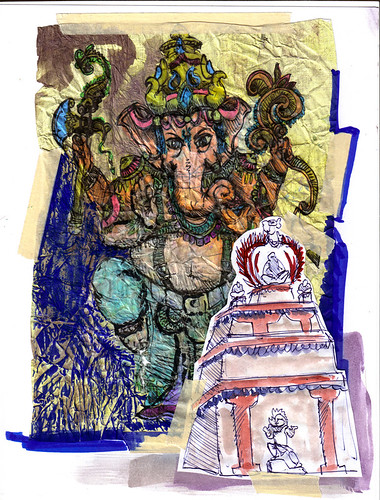So say the bumper stickers... but do we really want to take advice from the bumper of some redneck's pickup truck? I think that if we really want to have a conversation about freedom we should look to the east.
With spiritual freedom, it's a no brainer. Our normal concept of freedom is similar to the common Hindu dichotomy of svacchanda, to act by ones own desire, and paracchanda, forced to act by another's desire. But beyond that, the real goal is freedom from desire altogether. It's a broad concept that goes by many names, in the Brihadaranyaka Upanishad, the word used is aticchanda. More specifically with this word, it also implies a lack of consciousness of virtue and sin. I think that's such an important aspect. It implies that even if our behavior and efforts are toward the goal of being good, we're someone who's somehow missed something from somewhere. It can sound so hokey, but wouldn't we see past the crimes of others if we weren't using them to define our own virtues?
Also, Yung Ho Chang, the architecture head of MIT, was talking about China in this podcast. He had some really interesting things to say about freedom and the little citizen. I don't want to misquote, I'm only repeating him as I understood him when I heard the interview two weeks ago. He mentions this concept of the little citizen or the everyday citizen, which I think we generally think of as popular culture. So, where the Chinese recognize a noble individual, we recognize an ugly mass. We all know pop culture sucks, it's a whole lot of just because ideas and trends.
China isn't known for political freedoms or free speech, but Chang argues that they have personal free speech that might put us to shame. His example alluded to the "freedom isn't free" mentality. We're free to say whatever we like about politics as loud as we like and generally wherever we like without fear of legal consequences, but social repercussions are altogether different. Although they might not have our Bill O'reilys or Keith Olbermanns, Chang says that in China, fringe political views don't make you a social pariah. People ACTUALLY accept and value a diversity of ideas. Whereas we sort of do this theatrical thing where we invite diversity, then put up fences for even minor differences of opinion.
When I was first listening to this, I figured that was fine by me. After all, I didn't want to be friends with these warmonger, right-wing, bible fanatics anyway. And maybe that's part of the problem. Maybe that's why the music is so loud at bars, we'd be horrified to find out what everyone else really thinks.


1 comment:
this is great.
why have you stopped posting?
Post a Comment